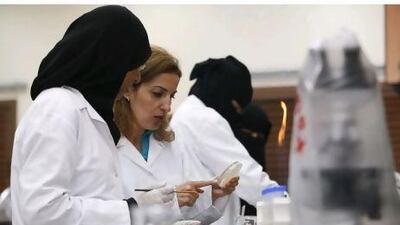DUBAI // The Biotechnology University College is in its second year, but already has 150 students enrolled for its sole undergraduate course.
The college, funded by the Abu Dhabi Chamber of Commerce and based in Dubai, is one of five institutions offering the course so far in the UAE, whose higher education landscape is dominated by business degrees.
"This is something that meets the needs of society, plus they're learning something interesting," said Dr Imtiaz Khalid, the college's assistant professor of chemistry.
"The students will have a wide array of career options," she said.
The college is now looking for companies to collaborate with so that by the time students reach their fourth and final year, they can begin internships to prepare them for the workplace.
Rawan Mohammed, 17, is one of the college's first cohort. She finished high school early, top of her class, and chose biotechnology after seeing many medicine graduates struggle to find jobs in their field.
"In biotechnology there are niche jobs," she said. "It's so diverse - in areas like the environment, DNA forensics, industry and petroleum, and pharmacy and medicine."
Arash Akhondi, 19, is also in the first cohort. "This degree will give me lots of options," he said. "I still haven't decided what I want to focus on but I'm interested in the medical field and DNA."
An indicator of the field's potential is the growth of Dubai's biotechnology and research park, DuBiotech, which opened in Al Barsha in 2005 and now has 86 biotechnology, pharmaceutical and laboratory-equipment companies and testing laboratories, including the pharmaceutical firms Pfizer and Merck Sorono.
However, Iba Masood, the founder and chief executive of Gradberry, the Middle East portal for graduate jobs and student internships, questioned the prospects for fresh graduates.
"People talk about it being a rising industry but I don't think it's a field that would hire fresh graduates - I think they'd be looking for experience and hire from abroad," she said. "Chances are, the students will have to go abroad to get more experience or do research work."
Marwan Abdulaziz, the business development manager at DuBiotech, agreed that companies prefer not to employ graduates without experience. To address this, DuBiotech is looking to launch a one-year training programme for new graduates, he said.
However, universities still do not do enough to instill awareness of these growing industries in their students, he said.
Other than Biotechnology University College, the only institutions in the UAE offering first degrees in biotechnology are the American University of Ras Al Khaimah, the University of Sharjah, Manipal Dubai and the new Amity University Dubai, which has not yet enrolled any students in its course.
Prof Samy Mahmoud, the chancellor of the University of Sharjah, said its biotechnology course had grown rapidly since it started in 2009 with 25 students. The number of students increased to 59 last year and 144 this year. He expected many to go on to the university's master's and doctorate courses in molecular medicine.
The faculty has close links with sister colleges, and its degrees are issued both by the University of Sharjah and Britain's University of Sheffield, one of Europe's leading institutions in the subject.
"You can't have a standalone programme," Prof Mahmoud said. "Without a science or medical college, it can't survive."
He said hospitals were desperate for biotechnology graduates to work as molecular analysts, adding that the university's graduates would be snapped up by Dubai's University Hospital, which opened last month.
Already, its students due to graduate next year are lined up for internships with companies such as Julthar Pharmaceuticals in Ras Al Khaimah, and will spend part of the summer at the University of Sheffield, in England. Sheffield academics visit regularly to ensure the course remains up to scratch.
Prof Ian Cumbus, head of the Ministry of Higher Education and Scientific Research's Commission For Academic Accreditation, which licensed the Biotechnology University College, said it was filling a niche.
He said starting small put the college in a good position to grow steadily.
"It's started very well with a good cohort of students," he said.




